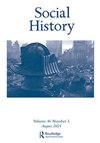Making space: towards a spatial history of modernity in caste-societies
IF 1.1
1区 历史学
Q1 HISTORY
引用次数: 2
Abstract
ABSTRACT A vibrant public sphere has come to be recognised as a necessary condition of modern democracies. Jürgen Habermas’s work has been a convenient point of departure for studies concerned with the concept of the public sphere and modernity, despite evidence mounting from feminist, postcolonial and subaltern studies that its despatialised nature and universalistic assumptions render invisible large groups that remained – temporally and spatially – outside the ‘mainstream’. Using examples from colonial and early modern India, this article demonstrates how these limitations play out in complex societies and why ‘space’ is pivotal in studying the public sphere, especially in caste societies. Following the spatial (re)turn within academia in the last decades, I argue that Henri Lefebvre’s work on social spaces provides a theoretical alternative that treats space with analytical rigour, allowing us to problematise the concept of the public sphere and to move away from Western Europe as an ‘ideal type’. The article demonstrates how an approach that is informed by Lefebvre’s framework is particularly useful in societies where caste influences spatiality and, consequently, lived experience – as well as having broader resonance and application.制造空间:朝向种姓社会现代性的空间历史
一个充满活力的公共领域已经被认为是现代民主的必要条件。j根·哈贝马斯的作品一直是研究公共领域和现代性概念的一个方便的出发点,尽管越来越多的证据来自女权主义、后殖民主义和下层社会的研究,表明其绝望的性质和普遍主义的假设使得在时间和空间上仍然处于“主流”之外的不可见的大群体。本文以殖民时期和早期现代印度为例,展示了这些限制如何在复杂的社会中发挥作用,以及为什么“空间”是研究公共领域的关键,尤其是在种姓社会中。随着过去几十年学术界的空间(再)转向,我认为亨利·列斐伏尔在社会空间方面的工作提供了一种理论选择,以严谨的分析方式对待空间,使我们能够将公共领域的概念问题化,并远离西欧的“理想类型”。这篇文章展示了以列斐伏尔的框架为基础的方法是如何在种姓影响空间性,从而影响生活经验的社会中特别有用的,并且具有更广泛的共鸣和应用。
本文章由计算机程序翻译,如有差异,请以英文原文为准。
求助全文
约1分钟内获得全文
求助全文
来源期刊

Social History
HISTORY-
CiteScore
1.10
自引率
0.00%
发文量
37
期刊介绍:
For more than thirty years, Social History has published scholarly work of consistently high quality, without restrictions of period or geography. Social History is now minded to develop further the scope of the journal in content and to seek further experiment in terms of format. The editorial object remains unchanged - to enable discussion, to provoke argument, and to create space for criticism and scholarship. In recent years the content of Social History has expanded to include a good deal more European and American work as well as, increasingly, work from and about Africa, South Asia and Latin America.
 求助内容:
求助内容: 应助结果提醒方式:
应助结果提醒方式:


